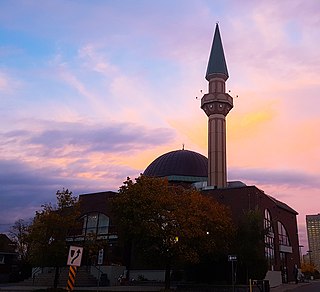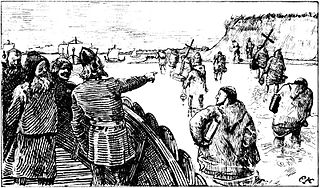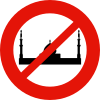
In modern usage, hijab generally refers to various headcoverings conventionally worn by most Muslim women. While a hijab can come in many forms, it often specifically refers to a headscarf, wrapped around the head and neck, covering the hair, neck, and ears but leaving the face visible. The use of the hijab has been on the rise worldwide since the 1970s and is viewed by many Muslims as expressing modesty and faith. There is a consensus among Islamic religious scholars that covering the head is either required or preferred, though some Muslim scholars and activists argue that it is not mandated.
Islamophobia is the fear of, hatred of, or prejudice against the religion of Islam or Muslims in general, especially when seen as a geopolitical force or a source of terrorism.

Islam in Canada is a minority religion practised mostly by the immigrants and their descendants from Muslim majority countries. Muslims have lived in Canada since 1871 and the first mosque was established in 1938. Most Canadian Muslims are Sunni, while a significant minority are Shia and Ahmadiyya.

The Muslim Council of Britain (MCB) is a national umbrella body with over 500 mosques and educational and charitable associations affiliated to it. It includes national, regional, local, and specialist Muslim organisations and institutions from different ethnic and sectarian backgrounds within major parts of, but not all, British Islamic society.

Islam is the second largest religion in Norway after Christianity. As of 2021, the number of Muslims living in Norway was 169,605. The majority of Muslims in Norway are Sunni, with a significant Shia minority. 55 percent of Muslims in the country live in Oslo and Akershus. The vast majority of Muslims have an immigrant background, and very few Norwegians are Muslim.

The English Defence League (EDL) is a far-right, Islamophobic and generally xenophobic organisation in the United Kingdom. A social movement and pressure group that employs street demonstrations as its main tactic, the EDL presents itself as a single-issue movement opposed to Islamism and Islamic extremism, although its rhetoric and actions target Islam and Muslims more widely. Founded in 2009, its heyday lasted until 2011, after which it entered a decline.
Stop Islamisation of Norway is a Norwegian anti-Muslim group that was originally established in 2000. Its stated aim is to work against Islam, which it defines as a totalitarian political ideology that violates the Norwegian Constitution as well as democratic and human values. The organisation was formerly led by Arne Tumyr, and is now led by Lars Thorsen.

Hege Storhaug is a Norwegian political activist and author. Since the 1990s she has been known for her criticism of Islam and later anti-immigration activism. She formerly worked as a journalist, and now runs the small anti-Islam organization Human Rights Service with her partner. In 2015 she published the bestselling book Islam, den 11. landeplage, later translated to English as Islam: Europe Invaded. America Warned, which claimed that Islam is a "plague." Scholars and commentators have described her views as far-right and Islamophobic.
Document.no is a Norwegian far-right anti-immigration online newspaper. Academics have identified Document.no as an anti-Muslim website permeated by the Eurabia conspiracy theory. The website received global media attention in connection with the 2011 Norway attacks due to its association with perpetrator Anders Behring Breivik, a former comment section poster on the website.
The Norwegian Centre Against Racism or Anti-Racism Centre is a non-governmental organization based in Oslo, Norway established in 1983. The organization’s main objective is to achieve a socially just society through the fight against racism and discrimination. The Centre works toward its objective through the documentation and prevention of racism, racism awareness, and the mobilization of the minority population in Norway.
The European Defence League (EDL) is a largely UK-based offshoot of the English Defence League founded by Tommy Robinson which campaigns against what it considers sharia law and itself has various offshoots. The group was set up in October 2010 and held its first demonstration that month in Amsterdam, Netherlands, at the trial of Dutch anti-Islam politician Geert Wilders.

American Muslims often face Islamophobia and racialization due to stereotypes and generalizations ascribed to them. Due to this, Islamophobia is both a product of and a contributor to the United States' racial ideology, which is founded on socially constructed categories of profiled features, or how people seem.
Islamophobia in Australia is highly speculative and affective distrust and hostility towards Muslims, Islam, and those perceived as following the religion. This social aversion and bias is often facilitated and perpetuated in the media through the stereotyping of Muslims as violent and uncivilised. Various Australian politicians and political commentators have capitalised on these negative stereotypes and this has contributed to the marginalisation, discrimination and exclusion of the Muslim community.
Islamophobia in Canada refers to a set of discourses, behaviours and structures which express feelings of anxiety, fear, hostility and rejection towards Islam or Muslims in Canada.
Islamophobia in the United Kingdom refers to a set of discourses, behaviours and structures which express feelings of anxiety, fear, hostility and rejection towards Islam or Muslims in the United Kingdom. Islamophobia can manifest itself in a wide range of ways; including, discrimination in the workforce, negative coverage in the media, and violence against Muslims.
Iman Meskini is a Norwegian actress. She is best known for playing the role of Sana Bakkoush in the teen drama series Skam.
Islamophobia in Sweden refers to the set of discourses, behaviours and structures which express feelings of anxiety, fear, hostility and rejection towards Islam and/or Muslims in Sweden. Historically, attitudes towards Muslims in Sweden have been mixed with relations being largely negative in the early 16th century, improving in the 18th century, and declining once again with the rise of Swedish nationalism in the early 20th century. According to Jonas Otterbeck, a Swedish historian of religion, attitudes towards Islam and Muslims today have improved but "the level of prejudice was and is still high." Islamophobia can manifest itself through discrimination in the workforce, prejudiced coverage in the media, and violence against Muslims. The anti-immigration and anti-Islam Sweden Democrats is the second largest party in the Riksdag.

Hijabophobia is a type of religious and cultural discrimination against Muslim women who wear the hijab. The discrimination has had manifestations in public, working and educational places.

While the constitution of Norway establishes that the King of Norway must be Evangelical Lutheran, it also establishes that all individuals have the right to exercise their religion. The government's policies generally support the free practice of religion in the country, and it provides funding to religious organizations and anti-discrimination programs on a regular basis. According to non-governmental organizations (NGOs) and the Norwegian police, religiously motivated hate speech is prevalent, particularly online, and primarily targeting the Muslim and Jewish communities.









